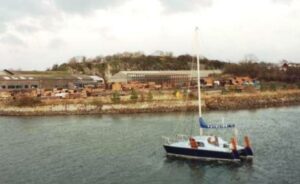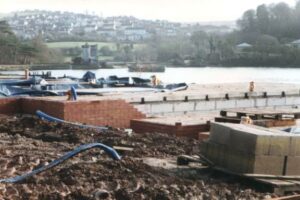
Planning permission was granted to Tay Homes S.W.Ltd in 1995 to build 51 houses on the northern side of Hooe Lake. This site had formerly been a limestone quarry then more recently a timber yard. The photograph shows a view of the site some years before the development.
In October 1996 a Sales Office was put up to the right of the entrance to the then Boston’s Boatyard in Baylys Road and houses were being sold off plan. During the next few months the layout of the road took shape, plots were laid out and building began.

The quarry face in Turnchapel is clearly seen in the distance as well as the houses in Tapson Drive, Turnchapel on top of the cliff face.

The building of the houses began. The first residents moved in during the early summer of 1997. Phase Two houses nos. 27-53 were finished by December 1998.
The road was named The Old Wharf, at the suggestion of one of the early residents Pat Constable.
If you have any interesting pictures, stories or aticles of HooeLake, Radford, Oreston, Turnchapel or local areas then please let us know by emailing info@hooelake.org or leaving a comment below. Thankyou.
Unfortunately one of the four was found in the quarry, probably the result of a fox. On a brighter note there were twelve seaward side over the weekend along with two Canada Geese.
Well, as far as I can see from spending many happy days walking by said lake, when mother and father are ready to produce more baby swans, they attack the last lot of “babies” ferociously. I saw them a few days ago attacking the babies, it appears that one has left and one remains?
Nature seems always to have a response to any difficulties, perhaps this is a female swan and the mum is feeling responsible? Perhaps we should consult Sigmund Freud.
In response to your question about the swans; for a number of years since the houses at The Old Wharf were completed, a pair of swans were resident on Hooe Lake and brought up their subsequent families. About five years ago one of the pair died and since then various swans have come into the lake for short periods – sometimes as many as 8 or 9 – but as far as I can tell we do not have a permanent pair of swans now, unlike Radford Lake. Maybe someone else who is more expert on our swans can enlighten us further. Pat
During a visit to the lake over Chrismas there were 4 swans on the lake. There are now three. Does anyone know what happened to the 4th swan?
Brian Steele